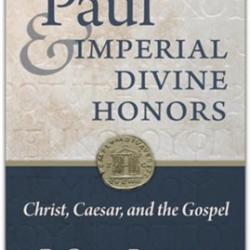Dylan Potter has released an interesting new book called Angelology.
I caught up with Dylan recently to discuss the book and his take on all things angelic.
Enjoy!
Instead of asking, “what is your book about,” I’m going to ask the question that’s behind that question. And that unspoken question is, “how are readers going to benefit from reading your book?”
Dylan Potter: In researching and writing the book, I was looking for patterns and themes throughout Scripture and theology that could help the reader answer the question: ‘What purpose do angels serve?’
I felt the best way to answer that question was to take a historical survey, starting from the Old Testament and ending with the modern era, on the numerous ways angels have figured into Judeo-Christian literature. This study of angels is typically referred to as ‘angelology’.
The topic of angels engages people on a number of levels, and I find that exciting as a way of exploring people’s assumptions about God, the Bible, and how they understand the world around them.
First, one has to appreciate that angels, or more generally, higher-order beings, are found throughout the Ancient Near East. I don’t think we can truly understand the subtext of passages like Gen 3:24, or why God commanded the Hebrews to stitch images of seraphim into the Tabernacle, or to adorn the Ark with two angelic beings, without a deeper appreciation for the surrounding culture.
For instance, notice that in Gen 3:24 we are just told that cherubim are placed as guardians of the entrance to the Garden of Eden. There is no footnote to tell us what a cherub is because the original hearers already had that concept as part of their worldview. In fact, the images of similar beings were common in palaces and pagan temples throughout the region. We, however, are thousands of years removed from that world, so it takes a bit of effort to understand the significance of higher-order beings in relation to important places and events.
Early worshippers would fully understand the significance of seraphim and cherubim within the Temple, whether in a vision like Isaiah’s or Ezekiel’s, or in the wall-carvings and statuary described in Solomon’s Temple. So this raises questions like ‘Why doesn’t God simply speak to the prophet? Why send an angel?’ and ‘Why does God insist that there should be so many images of angels in spaces dedicated to worship?’
Jumping to the New Testament, angels like Gabriel and Michael–who were first mentioned in Daniel–are instrumental in the events surrounding the birth of Jesus. Later, they are present at key points in the formation and growth of the early church. Depending on one’s interpretation of the book of Revelation, it is the angels who appear to be the enforcers of God’s judgment. In fact, the first verse of Revelation tells us that John’s vision was somehow communicated by an angel. So, I’d like to think that angels are pretty important figures for understanding the work of creation and redemption. My hope is that readers will see why angels play such large roles in the biblical narrative.
What is the “heavenly host” or “divine council” mentioned in Scripture?
Dylan Potter: This is a big question as it applies to angels. Moving from Genesis, where angels directly intervene in the lives of the Patriarchs, Abraham, Isaac, and Jacob, angelic beings begin to emerge as part of a ‘divine council’ that acts as YHWH’s liaison between heaven and earth.
Some key texts that reflect this are Job 1:6-12; 1 Kgs 22:19-22; 2Chr 18:18-22; Ps 29:1-2; 89:6-9; 95:3; 96:4; 97:7,9; 148:2.
The appearance of God in Isa 6 strikes me as an obvious allusion to the ‘divine council’ paradigm. However, rather than positioning God as the judge of incompetent sub-deities as in Ps 82, Isaiah describes a pair of six-winged seraphs who carry out YHWH’s commands flawlessly, praising him for his glory (this is similar to the scene in Rev 8:2-3).
During the era of the prophets, the depiction of angels–rather than pagan sub-deities–as part of the divine council, was a strong statement about their belief in monotheism and God’s transcendence. This council is represented in both Isa 6 and Ezek 8-10 by a throne/altar scene in the temple, burning coals, angelic beings and a prophet. Similarly, much of the imagery in the Dan 7 vision is similar although it is less detailed. It could be that the angelic court imagery in Isaiah, Ezekiel, and Daniel was a necessary reminder to Israel because of a theological relapse into superstitions about the divine council. It is equally likely that the texts are also meant to express the heavenly character of temple worship, as something in which angels participate.
Do you believe that the Bible confirms the idea that there is an hierarchy in the angelical world? If so, please give evidence for this from Scripture.
Dylan Potter: Yes, but how that hierarchy is organized is anybody’s guess. Christian theologians have wrestled with these distinctions and the various, albeit sparse, details in the biblical record.
That there are different categories of higher-order beings is clear. The Bible mentions angels, archangels, cherubim, seraphim, as well as other categories like thrones, powers, rulers and authorities that some believe refer to celestial beings. However, the only clear indication that some sort of celestial hierarchy truly exists is in the biblical distinction made between an ‘archangel’ and an ‘angel’.
More interestingly, for many hundreds of years Christian theologians have mulled over not just the existence of an angelic hierarchy, but how and whether such a hierarchy is a blueprint for the church. In my book, I delve into this history, mainly by exploring the theology of Pseudo Dionysius, a late 5th century theologian, who argued that the church is essentially an extension of the celestial hierarchy.
Pseudo Dionysius actually coined the term ‘hierarchy’, which he constructed from hieros (sacred) and arche (source), to describe the relationship between God and lesser instrumentalities ordained to mediate and participate in sacred realities. His theology is comprised of two principal hierarchies, the celestial (dealing with angels) and the ecclesiastical (focusing upon roles within the church).
Pseudo Dionysius’s hierarchies complement one another so that God’s self-revelation is seen as a downward procession through the celestial hierarchy and the ecclesiastical hierarchy, which facilitates the worshippers’ understanding of God and our place in the universe. Angels are an important part of this system because as heavenly beings, they are closer than we are to the transcendent God, both in terms of position and nature.
While we naturally think of the Holy Spirit as a sort of lynch pin between the ascended Christ and the world as we know it, Christians tend to forget that even in the early church, when the Spirit’s presence was very obvious to believers, the angels still played a prominent role in reinforcing the presence of divine love and purpose among those early communities. (See Acts 5:18-19; 7:53; 8:26; 10:3-6, 22; 12:15; 27:23, 24.) In other words, neither the resurrection nor the presence of the Spirit nullifies the roles and responsibilities of the angels within the present world.
Similarly, Pseudo Dionysius implies that the ascended Christ, as God, is not only the creator of the angelic hierarchy, but was a beneficiary of angelic intercession while he was in the world physically, and that he also actively mediates his care for his church through angels (Heb 1:14).
In the NIV, NLT, ESV, NASB, HCSB, NKJV, KJV, and the Jubilee Bible, 1 Corinthians 6:3 says we (God’s people) shall one day “judge” angels. Is this the correct translation? If so, what does it mean that we will one day judge angels? If it’s the wrong translation, what does the text and why do so many translations have it incorrect?
Dylan Potter: As you know, the context of the passage in 1 Cor 6:1-6 calls upon Christians to turn from being litigious, especially when another believer is concerned. Verse 3 raises the stakes by putting forth a rhetorical question: “Do you not know that we will judge angels?”
The appeal made to the church at Corinth is interesting here, because it aims to remind them of who they (and we!) are as followers of Jesus and children of God. Christ’s atonement for our sins and our just standing because his righteousness has been imputed to us means that we are the objects of divine love in a way that angelic beings are not. The early chapters of Hebrews makes this point abundantly clear as well—Christ died for humanity, not for angels; as a result, God calls us, not angels, his children.
So, as audacious as it may sound, the idea in this passage is that redeemed human beings have such a high spiritual standing that they will be tasked with ruling over or judging (the Greek word can mean either) angelic beings when God calls all things into account, but there is no clear explanation concerning which angels we will judge/rule over or what precisely that will look like.
I think the big idea here is that since we will one day be competent enough to handle such a great responsibility, we should seriously reconsider our approach to earthly disagreements.
Jude 8-10 says,
“Likewise also these dreamers defile the flesh, reject authority, and speak evil of dignitaries. Yet Michael the archangel, in contending with the devil, when he disputed about the body of Moses, dared not bring against him a reviling accusation, but said, ‘The Lord rebuke you!’ But these speak evil of whatever they do not know; and whatever they know naturally, like brute beasts, in these things they corrupt themselves.“
I have two questions about this text:
Question 1: What’s this business about Michael disputing about the body of Moses?
Dylan Potter: Your Answer
First, we need to acknowledge that nobody today really knows what the subtext of the dispute over Moses’ body was, or why the devil would concern himself with Moses. The writer and the original audience knew, but the rest seems to be lost to history. That hasn’t stopped people from guessing, however!
There are some who believe this is a reference to a legend from one or more apocryphal and pseudepigraphal works, but that is a long discussion, and we simply do not have much to go on because the writings we have are incomplete.
However, Deut 34:6 tells us that God buried Moses in Moab somewhere, and that nobody knows his exact burial place. Some writers have suggested that the devil may have wanted to either desecrate Moses’ body or to turn it into some sort of idol so that people would worship it, but there is no evidence to support either of these positions.
However, Michael’s response is interesting in that he appeals to the Lord to judge the devil rather than taking it upon himself to thwart the devil’s plan. The word “archangel” literally means “chief angel”, so Michael is portrayed as a powerful angelic being who outranks other angels.
Perhaps that is an important lesson for the church to learn today in terms of spiritual warfare; namely, that we are to resist the devil and to seek the Lord’s protection rather than trusting in our own might or power, because this is the very example given to us by even the most powerful of God’s angels.
Question 2: The parallel text (2 Peter 10-11) says, “They are not afraid to speak evil of dignitaries, whereas angels, who are greater in power and might, do not bring a reviling accusation against them before the Lord.”
What is the meaning of “speaking evil of dignitaries” and “even angels do not bring a reviling accusations against them before the Lord” – who are these “dignitaries” and how does instruction apply to God’s people today?
Dylan Potter: These verses have a long history of varied interpretation, but my opinion is that the passage refers to false teachers in the early church who were quick to assert their own teaching and authority, even if it meant contradicting or belittling the teaching and authority of the apostles and church leaders. It may also have something to do with the role of angels, as if to say: “These false teachers are so arrogant that they do not even respect the holy angels of God…in fact, they revile them!”
Whether or not we can make that claim does not undermine the larger point, that even the angels, who are perfectly obedient, have great regard for God’s ordained order. The angels would not dare to even revile these false teachers before God because they trust that judgment belongs to the Lord. This is a reminder to God’s people that we should honor and pray for authorities (1Tim 2:1-4), and trust that Christ will continue to build his church even if those in office may, like us, fall short of his glory in many ways.
The pattern in a number of the passages you raise so far is that the author appeals to the holy angels as examples of humility and steadfast trust that God will guide and guard his people, even when false teachers or the devil are doing everything in their power to undermine the church.
What else would you like readers to know about your book?
Dylan Potter: I’d like believers to consider the idea that angels play a pivotal role in understanding who God is. Throughout Scripture, angels demonstrate both God’s transcendence, or “otherness”, and imminence, or his “nearness”. Therefore, when we read the Bible, and it speaks of an angel, we should be thinking, “What does this account tell us about God and his role in the surrounding events?”
God uses his angels in the same way a king uses servants, messengers, and armies. Could God do it without angels? Yes, but the fact that he chooses to use angelic intermediaries illustrates his glory and majesty, and we ought to ponder that fact once in a while.
On the other hand, the angel’s message in Scripture is often ‘Fear not!’ (Gen 21:12; Dan 10:12; Lk 1:30, 2:10; Mt 1:20, 28:5; Acts 27:24)…reminding the faithful that God is near, that he cares, that he is in control, and that he is working all things according to his plan.
Although even someone as close to Jesus as the apostle John made the mistake of worshipping the angel who delivered the vision we know today as the book of Revelation (Rev 22:9), angels are God’s servants, not objects of worship. That said, they are magnificent examples of what it means to be loyal, steadfast, and cooperative members of God’s kingdom.















